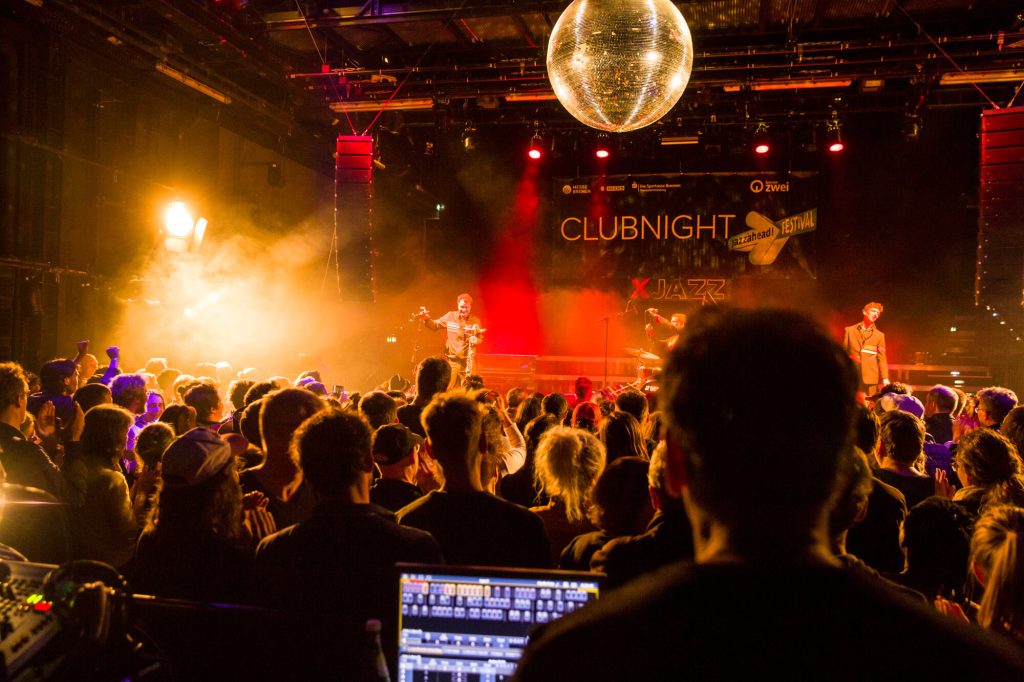Jobs in the event industry: clarity instead of clichés
When thinking of a job in the event industry you probably imagine people with headsets on and drinks in their hands who keep cool even amid totally chaotic circumstances. We all know them: these clichés that sometimes have a spark of truth to them, but other times are rather far from reality. In any case, one thing is certain: they do not offer an authentic insight. That’s why we think it is time to get rid of old clichés and provide clarity instead.
What are jobs in the event industry about?
In the event industry, everything revolves around events of every kind: from concerts and festivals to wine tastings, conferences, trade fairs and congresses. The focus is always on the experience.
That’s exactly what makes the event industry a job market with a future. Why is that? Because people want to experience something. To establish contact, to get to know something new, to gather experiences with all their senses, to feel alive, to absorb information and to live out emotions. That was the case yesterday and will remain the same tomorrow. And if something does change, the event industry will be flexible, react and retool – from presence to digital, from digital to hybrid, from hybrid to … we’ll see.
The goal always remains the same: Ideally, an event is transformed from an experience into a memory and ultimately into a complete success. For this to work, everyone has to pull together and work, think, coordinate and cooperate – and not always in the same place from 9 to 5, but instead every now and then with headsets on, amid chaotic circumstances and with cold drinks in their hands.
We would like to show you in more detail what fields of activity and tasks await you in the event industry, how the path to a career traditionally proceeds – with studies, training, internships and so on – and what exciting opportunities and job offers we at M3B GmbH have up our sleeves for you.

What jobs are there in the event industry?
For a big event to go according to plan, it needs many small building blocks and even more people involved. Planning and organising, hosting and promoting – all this is part of an event. Besides the actual hosts, there are also organisers, agencies and numerous service providers who contribute to the success of an event – for example caterers, DJs or chair rental companies.
Organising all this requires expertise, organisational talent and creativity, but also a profound understanding of business management, technology and legal conditions. Far too much to combine everything in one profession. That’s why you need them all: event managers, event coordinators, trade fair organisers, marketing managers, sales managers, market researchers, event technicians and so many more.
Once inside the industry, there are many opportunities and places to work in the event sector. The most common employers include:
- Agencies, more precisely event agencies and specialised agencies, namely “Professional Congress Organizers” or PCOs for short
- Organisers and promoters of trade fairs, congresses, concerts and other cultural events
- Large companies that manage their events themselves
- Public administration offices and agencies
In the following you can find out more about the main professional fields in the event industry.
Event management
Event managers are responsible for organising an event, from the initial idea to the applause at the end. They have to calculate, plan, coordinate and improvise – welcome to the world of management!
What does an event manager do?
As an event manager, you literally have to call the shots – you are responsible for making an event a success. This includes the creative conception, the detailed planning and, of course, the implementation. Event managers draw up a concrete time, budget and safety plan and ensure that it is adhered to. They are also responsible for coordinating the logistics. When the event is just around the corner, the guests want to be well looked after and the service providers also need a contact person on site.
You may be asked, for example, which exit the guest of honour can use to leave the event unnoticed, when the DJ will finally play Helene Fischer and where the spare toilet paper is stored.

Interesting fact: Have you ever wondered what actually distinguishes event managers from Event Management Assistents? At least not the fields of activity!
To be allowed to call oneself an Event Management Assistent, one must have completed the IHK-approved training, consisting of a school-based and a company-based part. The title event manager, on the other hand, is not protected.How do I become an event manager?
Here you will find some links to suitable courses of study in Europe as well as other ways to start your event management career in the UK such as apprenticeships and college courses.*
- Courses of study (Europe)
- Event Management
- International Festival and Event Management/International Events Management
- Leisure and Events Management
- Strategic Event Management (and Tourism Management)
- International Festival and Event Management with Language
- International Festival and Event Management with Entrepreneurship
- International Festival and Event Management with Tourism
- Business Administration, Major in Event Management
- Events & Experience Management
- Business and Management (Festivals and Events)
- many more
- Apprenticeships (UK)
- Events Assistant
- Hospitality Management
- College (UK)
- Event Planning
- Event Management
- Live Events and Promotion
But also from Cultural or Communication Management or other management and marketing fields, the path from university or training to event management can be successful – so don’t be discouraged!
What qualities do I need to be an event manager?
If you are looking for excitement, variety and responsibility in your workplace and have no problem with things getting stressful in the critical phase, you can find your dream job in event management. In addition to a strong organisational talent, a communicative nature, flexibility and the ability to work under pressure, a job in management often requires a good command of English and – depending on the area of responsibility – a certain amount of practical experience.
So an internship or two can’t hurt if you want to have an advantage when it comes to the job offer of your dreams.
Event marketing und sales management
Event marketing is all about promotion and sales, in other words, the measures taken to market an event and perfect its external presentation. Marketing and sales management can therefore not always be clearly separated from each other.
What does an event marketing manager or assistant do?
As an event marketing manager or assistant, the planning and implementation of event communication is in your hands: How do you best reach your target group? Which channels should be used and which marketing strategies should be implemented? How much advertising does the event need? Which language reflects the character of the event? These are all questions that event marketing staff have to deal with. The digital appearance, the presence in the media and the support of communication partners are just as much a part of your tasks as the definition and implementation of marketing goals, measures and more.

What does a sales manager do?
Sales managers are also part of the permanent “ensemble” in event marketing, they are responsible for everything that has to do with the sales of the event. In concrete terms, as a sales manager, you are responsible for looking after advertising and cooperation partners, sponsors and customers. This means that acquisition, preparing offers, negotiations, concluding contracts and so on are all part of your job.
How do I become an event marketing or sales manager?
Here you will find some links to suitable courses of study in Europe and apprenticeships in the UK.*
- Courses of study
- Event and Marketing Management
- Digital Marketing with Events Marketing
- International Festival and Event Management with Marketing
- Marketing with Festival and Event Management
- International Marketing with Tourism and Events
- Marketing Management for Events, Hospitality and Tourism
- Marketing/Marketing Management
- Economics and Business (Marketing)
- Marketing and Sales
- Public Relations
- many more
- Apprenticeships
- Marketing
- Advertising and Media Executive
- Business to Business Sales Professional
- Marketing Executive
- Marketing Manager
- Sales Executive
- PR and Communications Assistant
What do I need to get into event marketing?
Ultimately, there are many ways to get a taste of marketing, even in a rather unconventional way – a suitable degree or training is not always absolutely necessary. What is needed above all is a good dose of entrepreneurial thinking and business know-how. Marketing and negotiation strategies as well as the most important management basics should be part of your skills.
If you are also open-minded, articulate and enjoy networking and customer contact, a job in the event industry with a focus on marketing or sales will suit you well!
Event technology
In the end, every brilliant idea, every cooperation partnership and every service are useless if the technology fails. To prevent this from happening, every event needs an event technician – or preferably an entire team!
What does an event technician do?
Light and sound, software and hardware, video installations and stage constructions: All this is part of event technology. Since congresses and the like no longer take place only in a live format, but also have to function optimally as hybrid systems, an event technician absolutely needs IT skills as well.

How do I become an event technician?
Here you will find some links to suitable courses of study in Europe and apprenticeships in the UK.*
- Courses of study
- Sound, Light and Live Event Technology
- Industrial Engineering
- Audio and Music Technology
- Sound and Live Event Production
- Live Sound and Lighting Technology
- Technical Services with Live Sound Engineering
- Sound Engineering and Design
- Engineering Management
- many more
- Apprenticeships
- Assistant Visual Effects Technical Director
- Creative Venue Technician
- Live Event Rigger
- Live Event Technician
What else do I need to become an event technician?
If you are interested in a job in the event industry where the focus is on technical and construction work rather than customer contact and guest services, event technology has responsibility and variety in store for you. In addition to technical knowledge about lighting, sound and IT, you need a hands-on mentality in the literal sense – after all, all the technical equipment has to be set up and taken down. Also advantageous: spatial imagination, good ideas for design and staging and solution-oriented thinking. A good fit? Then let’s go!
Haven’t found the right job yet? Employers in the event industry offer numerous other job opportunities depending on their orientation and size – for example, as online marketing managers, PR managers or project managers.
Jobs at M3B
Trade fairs, congresses, concerts, cultural and sporting events, experiences – that’s the event industry in a nutshell. And we – the M3B GmbH – do all that.
We stand for trade fairs, markets and people, but also for being right in the middle of things – in Bremen, which is our hometown and city of hearts, where we provide for trade, experiences and enjoyment. Preferably on the grounds of MESSE BREMEN and CONGRESS BREMEN, in the ÖVB Arena, at the Großmarkt Bremen or in the Bremer Ratskeller.
If you want to get to know the event industry up close and in all its facets, you’ve come to the right place. Whether event marketing, public relations, trade fair business, management or sales, whether full-time, part-time, as a trainee or temp, whether expert or career changer: We are looking forward to getting to know you!
Looking for a job in the event industry? Discover our current job offers right now – or convince us with a speculative application that you are exactly right for us, even if the job offer that fits your needs and skills is not there at the moment.
* The linked courses of study, apprenticeships and further education opportunities or information pages are not to be understood as recommendations – we would have had to go through each one beforehand to be able to recommend them all. They only serve as initial inspiration.
